 Petzlover
Petzlover Caucasian Shepherd is originated from Russia but Bordoodle is originated from United States. Caucasian Shepherd may grow 20 cm / 8 inches higher than Bordoodle. Caucasian Shepherd may weigh 73 kg / 161 pounds more than Bordoodle. Caucasian Shepherd may live 3 years less than Bordoodle. Caucasian Shepherd may have more litter size than Bordoodle. Caucasian Shepherd requires Moderate Maintenance. But Bordoodle requires Low Maintenance
Caucasian Shepherd is originated from Russia but Bordoodle is originated from United States. Caucasian Shepherd may grow 20 cm / 8 inches higher than Bordoodle. Caucasian Shepherd may weigh 73 kg / 161 pounds more than Bordoodle. Caucasian Shepherd may live 3 years less than Bordoodle. Caucasian Shepherd may have more litter size than Bordoodle. Caucasian Shepherd requires Moderate Maintenance. But Bordoodle requires Low Maintenance
 This working dog is more than 2 000 years old, hailing from the Caucasus Mountains near the Georgian Republic, Russia.
This working dog is more than 2 000 years old, hailing from the Caucasus Mountains near the Georgian Republic, Russia.
The Caucasian Shepherd Dog is an ancient breed, always having been used to guard livestock in the mountains. Some believe they came from domesticated wolves, while others believe their ancestry includes Mastiffs and other breeds.
It was in the 1960s that the dog was used in Germany for patrol along the Berlin Wall. This dog is also known as the Caucasian Ovcharka and he is large and powerful, always being ready to take on anyone who threatens him or the livestock he is guarding.
His origins can be traced far back and eventually the dog found its ways to the USA where dog clubs were formed.The Caucasian Shepherd Dog is one of the oldest Molosser breeds, and today they are mostly appreciated for being wonderful family companions and watchdogs.
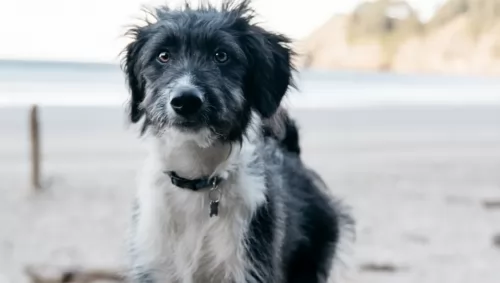 Known also as a Borderpoo or Borderdoodle, the Bordoodle is a designer- or hybrid breed which hails from the United States of America.
Known also as a Borderpoo or Borderdoodle, the Bordoodle is a designer- or hybrid breed which hails from the United States of America.
Both the dogs used in the development of this cross-breed are the Poodle and the Border Collie, and both these dog breeds have their own lengthy histories.
The history of the Bordoodle is short, as it is a modern crossbreed which has been purposefully bred by breeders to bring about a dog with certain looks and temperament.
 The Caucasian Shepherd is a large, impressive looking dog standing at between 64 – 75cm in height and weighing between 45 – 70 kg. He has an almost bear-like appearance. His coat can be shortish or even fairly long, and in different colors such as white, tan, brindle, grey and cream with a black mask.
The Caucasian Shepherd is a large, impressive looking dog standing at between 64 – 75cm in height and weighing between 45 – 70 kg. He has an almost bear-like appearance. His coat can be shortish or even fairly long, and in different colors such as white, tan, brindle, grey and cream with a black mask.
The puppies are born black and then lighten as they grow up. He has a large head with the muzzle being smaller than the skull, narrowing slightly. The nose is black and the ears are set high and are floppy with dark eyes. The tail is set high and is long.
The Caucasian Shepherd is an intelligent breed but he must be properly trained and socialized as he can be stubborn and want to go his own way.
He is a balanced dog and he won’t deliberately hurt whom he regards as family, but he shows distrust towards strangers. While socialization and training relax and calm a dog, the Caucasian Shepherd isn’t regarded as the best dog to have with children around. This is because he comes from a lineage of guard dogs, bred to fight and guard.
He is a dog breed that will require a firm, strong owner and if you don’t have a lot of time on your hands, the Caucasian can be difficult to manage and perhaps isn’t the best choice for a first-time dog owner.
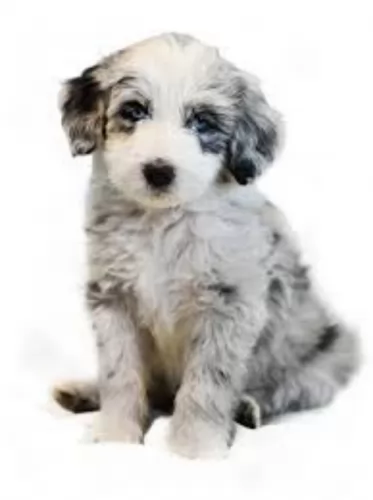 The Bordoodle isn’t a purebred dog but is a cross between a Poodle and a Border Collie.
The Bordoodle isn’t a purebred dog but is a cross between a Poodle and a Border Collie.
He has a soft, medium length coat which is inclined to be wavy. Colors are essentially black and white but chocolate, cream, fawn, merle and grey are also seen.
He is a medium sized dog standing at between 38cm and 55cm and weighing between 13kg and 27kg. The long tail is feathery, the ears floppy or semi-erect and the brown eyes are bright and intelligent. The muzzle is medium to long.
As with any mixed breed dog, the Bordoodle can take after either parent dog but generally the Borderdoodle will be a medium sized dog.
With the Bordoodle you can expect nothing less than a highly intelligent dog. That is because both the Poodle and the Border Collie are super intelligent dogs so the Bordoodle is guaranteed to have got a good portion of this intelligence from both breeds.
It makes training and socialization easy for the dog. It is important for your Bordoodle to be trained and socialized if you want him to be obedient and relaxed around strangers and other pets. As it is, his amicable nature makes the hybrid dog of yours a great family pet – getting on well with other pets in the home as well as with children.
Apart from being such a smart dog, the Bordoodle is active, playful, loving and devoted – everything a serious dog owner wants in a pet. This is a dog that doesn’t really know the meaning of the word aggressive.
 Loyal, strong, and brave, the Caucasian Shepherd Dog does an excellent job protecting his human family. He is a territorial dog and in the past he has always been ready to take on wolves and bear to protect his sheep. He isn't the best choice for first time dog-owners and where there are small children in the home.
Loyal, strong, and brave, the Caucasian Shepherd Dog does an excellent job protecting his human family. He is a territorial dog and in the past he has always been ready to take on wolves and bear to protect his sheep. He isn't the best choice for first time dog-owners and where there are small children in the home.
He will do well to be trained and socialized as he becomes an obedient, patient, gentle, loving pet that becomes an excellent companion and protector.
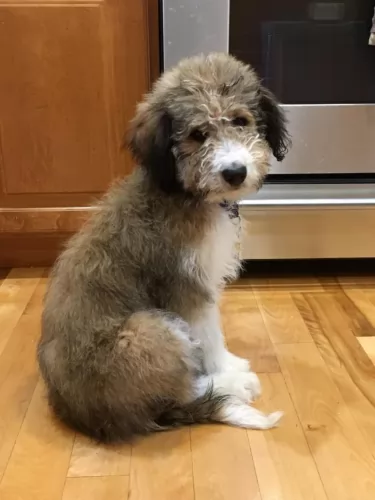 Bordoodles have two great dog breeds to thank for the way they turn out. When you think of the Border Collie and Poodle, you know you’re going to get a dog that is friendly, social, playful, loving and devoted – the ideal family pet.
Bordoodles have two great dog breeds to thank for the way they turn out. When you think of the Border Collie and Poodle, you know you’re going to get a dog that is friendly, social, playful, loving and devoted – the ideal family pet.
Intelligent, he is easy to train too, and with excellent care, you’re going to have a most wonderful family pet and companion, full of fun and life.
 Like all breeds there may be some health issues, even though the Caucasian Shepherd is generally a healthy dog. There are some common illnesses that every dog can get and which every responsible dog owner should be aware of -
Like all breeds there may be some health issues, even though the Caucasian Shepherd is generally a healthy dog. There are some common illnesses that every dog can get and which every responsible dog owner should be aware of -
One or two episodes of diarrhea isn’t an emergency, but ongoing diarrhea can lead to dehydration. If your dog is vomiting, he is lethargic and constantly emptying his bowels, see your vet if the diarrhea persists.
Parasites such as fleas and ticks and even internal parasites such as intestinal worms can drain the life from your pet. It is wise to find out about different parasites so that you can protect your dog. Find out what your vet’s treatment options are for parasites.
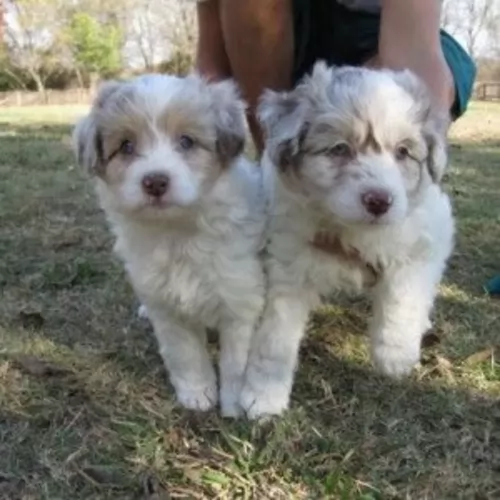 Bordoodles, when well cared for, can live to be 12-15 years of age. There aren’t going to be many health issues to contend with with your Bordoodle as there are no known health problems in this robust breed.
Bordoodles, when well cared for, can live to be 12-15 years of age. There aren’t going to be many health issues to contend with with your Bordoodle as there are no known health problems in this robust breed.
Nonetheless there are some common dog illnesses that you need to be aware of such as progressive retinal atrophy, hip dysplasia and hypothyroidism.
With hypothyroidism, the thyroid gland in the neck of your pet produces a hormone known as thyroxine that controls metabolism, but the disease hypothyroidism makes it that the gland doesn’t make enough thyroxine. Signs that your dog has this illness includes a dull coat, inflamed skin and even hair loss.
Get him to the vet immediately who will do blood tests and provide treatment. Mercifully it isn’t something that is life-threatening.
 The Caucasian Shepherd Dog has a thick double coat that will certainly require brushing twice a week. The coat comes in different lengths – short, medium and long. The hair is mostly long and the long tail is also feathery. The best way to groom your large, furry pet is to invest in some good grooming tools such as a good brush to keep your pet’s hair in tip-top condition.
The Caucasian Shepherd Dog has a thick double coat that will certainly require brushing twice a week. The coat comes in different lengths – short, medium and long. The hair is mostly long and the long tail is also feathery. The best way to groom your large, furry pet is to invest in some good grooming tools such as a good brush to keep your pet’s hair in tip-top condition.
His nails will need to be trimmed regularly, his ears will also need to be checked to avoid wax build-up and the accumulation of grime. This can lead to an ear infection. His teeth should be brushed 2 or 3 times a week with special dog toothbrush and toothpaste.
The Caucasian Shepherd isn’t going to do well in a small home with tiny garden in the city. He is a big dog that will require a large yard even though he is a fairly low-energy dog. He will be suited to a family that is active, that will take him on daily walks, hikes and include some ball games.
You will need to change your Caucasian Shepherd Dog’s food as he goes through the different phases of his life, from puppy to adulthood. Speak to your veterinarian about a commercially produced dog food is you’re unable to give him home-made food. These foods are available in breed-specific and age-specific formulas.
Reputable breeders will also help you ensure that you know how to start feeding your puppy. Caucasian Shepherds are a large breed and apart from their kibble, you’ll want to include rice, vegetables and cooked chicken from time to time in his kibble and also include raw meat occasionally.
If you're unsure, ask your veterinarian or breeder about the best diet to ensure his longevity. Clean, fresh water should be available at all times.
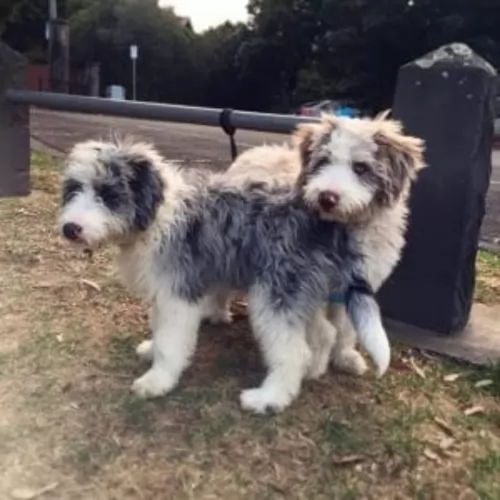 The Bordoodle is a dog which doesn’t shed that much so his grooming requirements are low and he is considered as a hypoallergenic dog.
The Bordoodle is a dog which doesn’t shed that much so his grooming requirements are low and he is considered as a hypoallergenic dog.
He will need to have his coat brushed at least twice a week to keep it shiny, soft and smooth. Depending on how your Bordoodle turns out, he may even require trimming at a professional groomer.
Make time to check his ears inside and out and learn how to clean the inside of his ears to avoid infection and wax build-up.
Dental hygiene is also imperative in dogs, and neglecting to do this will mean food particles and bacteria accumulating along your pet’s gumline, resulting in gingivitis and periodontal disease.
Every dog will require regular exercise and you can get your Bordoodle to join you in your walks. He is the kind of dog that can happily adjust to city or country life, but he will still need to have some ball games and other activities to keep him busy and happy.
He isn’t a dog that can be left alone day after day in the backyard. He is social and playful and loves the companionship of his human family.
If you feed your Bordoodle kibble from some of the top quality commercially produced foods, always research the dog food and take a good look at the ingredients.
The pet food you choose plays an important role in the longevity of your pet. There are commercially manufactured foods that have such poor ingredients that they can actually shorten your pet’s lifespan and cause stress to the kidneys and liver.
If in any doubt about what to feed your Bordoodle, speak to your vet. Cooked brown rice, cooked vegetables and cooked chicken can sometimes be mixed into your pet’s kibble. Raw meat should also occasionally be added in to ward off skin allergies.